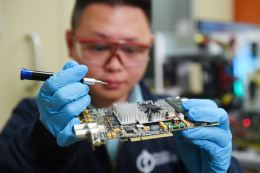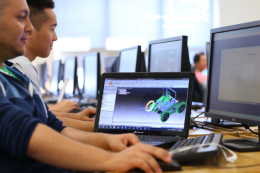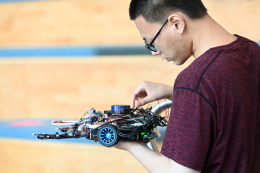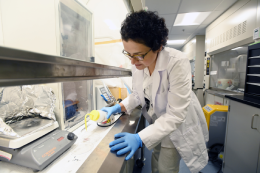Programs
Engineering Departments and Programs
The Faculty of Engineering contains six Departments, as well as the affiliated School of Biomedical Engineering.
Engineering Programs
Undergraduate Programs
Undergraduate students will have the option to choose from seven disciplines - Civil, Environmental, Electrical, Industrial, Mechanical, or Chemical.
Introducing Computer Engineering |
||
The Faculty of Engineering is thrilled to announce the launch of our Computer Engineering program, designed to equip students with cutting-edge knowledge and skills in one of the most dynamic and innovative fields of engineering. |
 |
|
Civil & Resource Engineering From the physical to the naturally built environment, Civil Engineers are dynamic professionals who build infrastructure such as highways, bridges, marine structures, residential and commercial buildings, water treatment solutions, and more. Learn More >> |
Environmental Engineering Environmental engineers offer sustainable and green solutions that protect our planet from some of the biggest challenges. From ensuring our drinking water is clean to remediation of environmental hazards involving soil and air pollution. Environmental engineers offer sustainable and green solutions that protect our planet from some of the biggest challenges. From ensuring our drinking water is clean to remediation of environmental hazards involving soil and air pollution.Learn More >> |
|
Electrical Engineering Computer option available to Electrical engineering students. |
Industrial Engineering From hospitals to airlines, Industrial Engineers design solutions to improve the performance of complex systems. |
|
Mechanical Engineering |
Chemical Engineering |
|
Graduate Programs
The Dalhousie Faculty of Engineering offers a wide range of opportunities for advanced graduate education and research. For information on graduate programs, admissions, funding opportunities, and other resources, refer to the Graduate Students section.
Biological Engineering |
Biomedical Engineering |
Civil Engineering |
Industrial Engineering |
Electrical Engineering |
Environmental Engineering |
Internetworking Engineering |
Mechanical Engineering |
Undergraduate Programs
Undergraduate Programs
Undergraduate students will have the option to choose from seven disciplines - Civil, Environmental, Electrical, Industrial, Mechanical, or Chemical.
Introducing Computer Engineering |
||
The Faculty of Engineering is thrilled to announce the launch of our Computer Engineering program, designed to equip students with cutting-edge knowledge and skills in one of the most dynamic and innovative fields of engineering. |
 |
|
Civil & Resource Engineering From the physical to the naturally built environment, Civil Engineers are dynamic professionals who build infrastructure such as highways, bridges, marine structures, residential and commercial buildings, water treatment solutions, and more. Learn More >> |
Environmental Engineering Environmental engineers offer sustainable and green solutions that protect our planet from some of the biggest challenges. From ensuring our drinking water is clean to remediation of environmental hazards involving soil and air pollution. Environmental engineers offer sustainable and green solutions that protect our planet from some of the biggest challenges. From ensuring our drinking water is clean to remediation of environmental hazards involving soil and air pollution.Learn More >> |
|
Electrical Engineering Computer option available to Electrical engineering students. |
Industrial Engineering From hospitals to airlines, Industrial Engineers design solutions to improve the performance of complex systems. |
|
Mechanical Engineering |
Chemical Engineering |
|
Graduate Programs
Graduate Programs
The Dalhousie Faculty of Engineering offers a wide range of opportunities for advanced graduate education and research. For information on graduate programs, admissions, funding opportunities, and other resources, refer to the Graduate Students section.
Biological Engineering |
Biomedical Engineering |
Civil Engineering |
Industrial Engineering |
Electrical Engineering |
Environmental Engineering |
Internetworking Engineering |
Mechanical Engineering |



 Mechanical Engineers make the world a better place – from building more environmentally friendly cars to designing medical devices and robots.
Mechanical Engineers make the world a better place – from building more environmentally friendly cars to designing medical devices and robots.